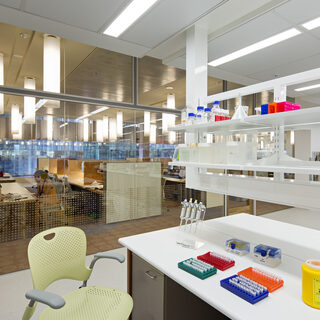Tradeline's industry reports are a must-read resource for those involved in facilities planning and management. Reports include management case studies, current and in-depth project profiles, and editorials on the latest facilities management issues.
Latest Reports
AgriBio, Centre for AgriBioscience
AgriBio, Centre for AgriBioscience is one of Australia's premier biosciences facilities, with a key emphasis on supporting and protecting Victoria's $8.4 billion (USD) agricultural sector by focusing on cutting-edge research to improve productivity, fight disease, and reduce environmental impact. The state-of-the-art research facility serves joint venture partners La Trobe University (La Trobe) and the Victorian Department of Primary Industries (DPI).
Measuring Reverse Airflow in Laboratory Failure Conditions
A study at Yale University suggests that quantitative performance analysis of laboratory airflow may show more conclusive results than traditional methods of measurement, and thus obviate the perceived need for costly retrofits and upgrades in order to comply with the CDC/NIH’s new prohibition against reversal of airflow under failure conditions found in Biosafety in Microbiological and Biomedical Laboratories 5th Edition (BMBL).
High Market Confidence Increases Capital Construction Costs for Near to Midterm
Non-residential construction volumes and pricing continued their upward trend in the second quarter, with prices increasing an average of 2 to 4 percent in the first half of 2013. These factors, along with growing market confidence and a narrowing labor supply, will continue to push new construction costs closer to the trend line for the near to medium term.
Translational Research Institute
Translational Research Institute (TRI) is a joint venture between The University of Queensland Diamantina Institute, Queensland University of Technology’s Institute of Health and Biomedical Innovation, Mater Research, and the Princess Alexandra Hospital Centres for Health Research.
Paul G. Allen Center for Global Animal Health
Washington State University’s three-story, 62,000-sf Paul G. Allen Center for Global Animal Health is the first of a two-phase project dedicated to infectious disease research and animal diagnostics. It houses the Paul G. Allen School for Global Animal Health, which provides innovative solutions to global infectious disease challenges through research, education, global outreach, and application of disease control at the human-animal interface. The second phase will be completion of the Washington Animal Disease and Diagnostic Laboratory.





